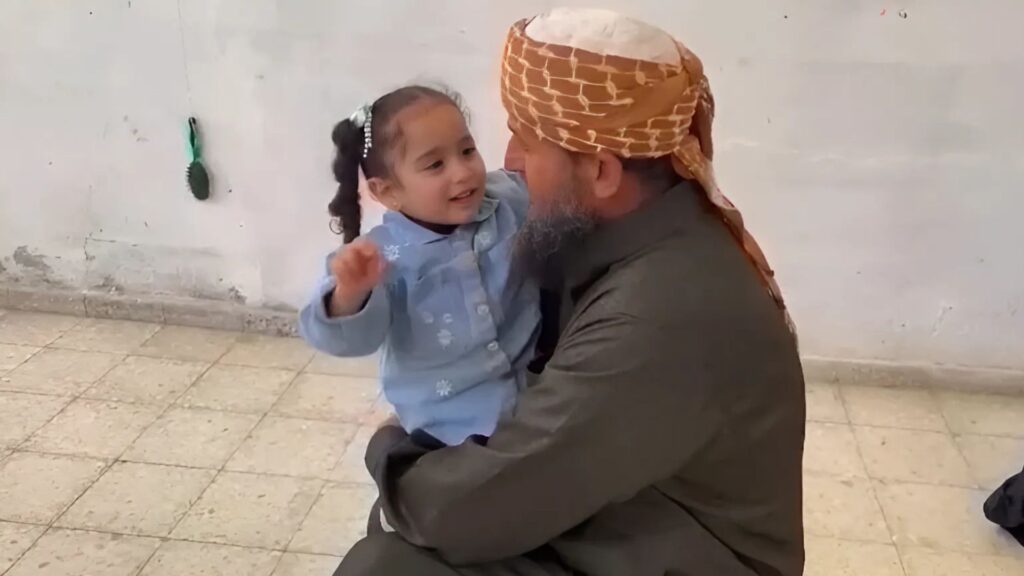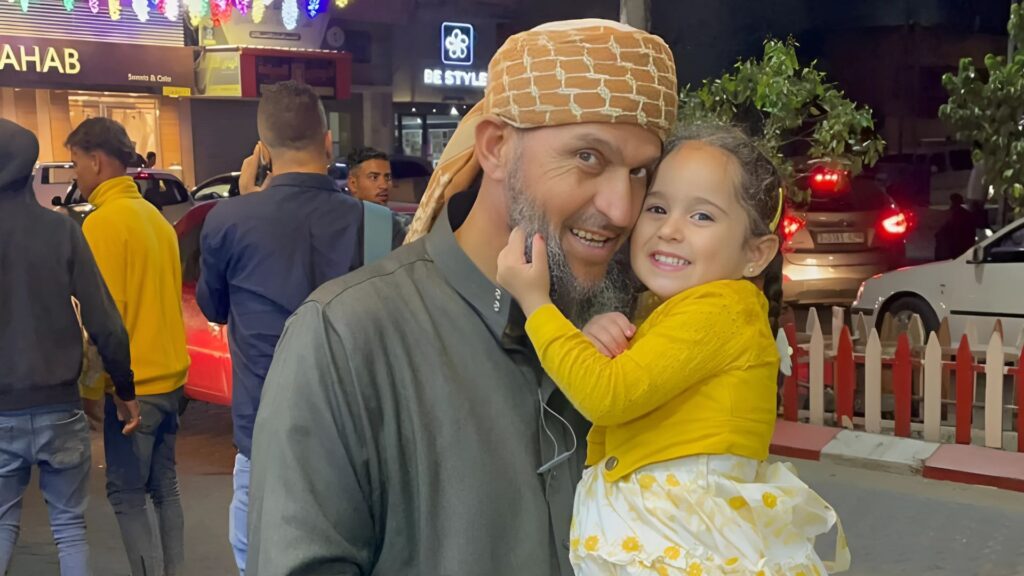“Know that death is an expression used for the journey from this world to the Divine Presence, for to Allah is the ultimate return.”
— Imam Al Ghazali
The world was touched last year by the heart-wrenching image of Nabhan, a Palestinian grandfather, mourning the loss of his beloved granddaughter, Reem, in an Israeli airstrike. His emotional display of love and grief was captured in a powerful video, where he kissed her, calling her the “soul of my soul.” These words resonated deeply on social media with #soulofmysoul, gaining millions of views.

In an interview with media houses, the grandfather Nabhan, also known as “Abu Diaa,” said, “She (Reem) used to hug me every day… Now I go to hug her spiritually in her grave.” In multiple other interviews, Nabhan shared that he kept their memories close by wearing Reem’s earring as a pin on his clothing.
After the devastating loss of his granddaughter, Nabhan committed himself to supporting others in the besieged Gaza Strip. He worked to raise awareness about the targeting of children, distributed humanitarian aid, and lobbied Egyptian authorities to grant access for children in need of medical treatment.
But a year later the sentence “soul of my soul,” once known for resilience, has changed to “Reunited in Heavens,” and Nabhan is set to hug Reem once again in another world.
The grandfather, Nabhan, was killed early on Monday in an Israeli bombardment pounding the Nuseirat refugee camp in central Gaza, local sources have confirmed.
The social media has yet again mourned the loss: “Khaled Nabhan spent the last year of his life carrying the grief of his murdered loved ones while providing small comforts to children trying to survive unimaginable violence. He stayed committed in his charity and kindness towards others in the midst of a genocide,” a user wrote on X.
“The man had an angelic presence, to say the least. He smiled in the face of a genocide and went around hospitals and camps comforting people despite his own pain… the demonized, turbaned Muslim man who was everything they said he couldn’t be. Kind. Loving. Righteous. Resilient. Too good for this world. Our hearts are broken,” Dr. Omar Suleiman wrote.
“His embrace of his murdered granddaughter, Reem, gave us a painful and human image of the loss being inflicted on Palestinians early on. Every loss of a Palestinian brings pain, but Khaled’s death hurts a little more today. May he embrace Reem and Tariq in the gardens of paradise soon,” US-based journalist Sana Saeed posted on X.
On Monday, Palestinian rights advocates honored Nabhan, remembering not only his deep bond with his granddaughter Reem but also his charitable efforts in the months following her death. Many praised his selfless actions to support others in Gaza during an incredibly difficult time.
“They first murdered his granddaughter, ‘the soul of his soul,’ then bombed his family’s home & now murdered him in broad daylight with impunity,” Muhammad Shehada, a writer and analyst from Gaza, wrote in a social media post.
The killing of Nabhan, nearly 13 months after the killing of ‘soul of his soul,’ manifests the toll of Israel’s war on Gaza; how hashtags are changing, but the onslaughts intensify. Israel has killed more than 45,000 Palestinians and wounded at least 106,962 since October 7, according to the Palestine health ministry.
In its recent monthly report on Palestine, the UN said that Gaza is facing an unprecedented humanitarian catastrophe. Approximately 1.9 million Palestinians have been displaced multiple times, while 70% of Gaza’s infrastructure, including health services and water and sanitation, has been destroyed, the report highlighted.

In an article titled ‘Gaza’s survivors face the mental challenge of ongoing acute stress’ by reliefweb, it has been highlighted that many patients hailing from Gaza to Amman hospital are experiencing not only post-traumatic stress disorder (PTSD) but even acute stress syndrome.
Many youngsters have witnessed the destruction of their homes, the loss of their siblings, and many have faced life-changing injuries. Moreover, they are constantly hearing the loss of their family members and friends.
Women and girls in Gaza, including approximately 50,000 pregnant women, are grappling with severe shortages of essential supplies as the humanitarian crisis deepens and winter approaches. The latest report from the United Nations Population Fund (UNFPA) highlights the alarming lack of food, shelter materials, and clean water, as well as deteriorating sanitation and hygiene conditions across the enclave. The situation continues to worsen, with basic necessities becoming increasingly scarce for those already enduring the impacts of conflict.
“Harsh winter temperatures, compounded by heavy rains and rising sea tides, are further exacerbating dire water, sanitation, and hygiene conditions, sewage accumulation, and the spread of disease,” the report says.

According to the report, 72 percent of women face difficulty in accessing menstrual hygiene products. For those living in Gaza, for those who have lost loved ones, the bombardments, the pain, and the trauma continue unabated.
It is not a sentence that has changed to “Reunited in Heavens” but the killing of an entire family. His death is not just another hashtag or fleeting moment of mourning; it is a reminder of unyielding suffering that continues to unfold in Gaza.
As the world turns its attention to the next headline or viral hashtag, it must remember the ongoing suffering of Gaza and the resilience of those like Nabhan who continue to fight for dignity, justice, and the hope of one day reuniting with loved ones in peace.


